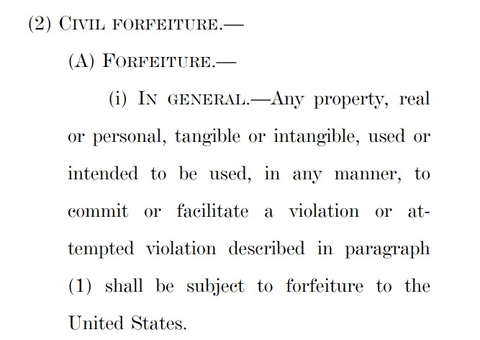Restrict Act uses TikTok as trojan horse for asset forfeiture
There are simple TikTok bans available, if a TikTok ban is the goal. But the Restrict Act is about asset forfeiture
Across America, governments are turning against the social media platform TikTok.
Earlier this month, the state of Michigan quietly banned state employees from using TikTok — with the exception of Gov. Gretchen Whitmer — and Congress is weighing a ban on the app. TikTok ban bills have been submitted in Congress for years.
Last week, TikTok CEO Shou Chew was subjected to an hours-long browbeating from the U.S. House Committee on Energy and Commerce.
From Democrats and Republicans alike, TikTok was accused of all manner of wrongdoing, from spying on Americans to offering their data directly to the Chinese Communist Party.
Official America is increasingly speaking with one voice on TikTok, and that voice is trending toward a ban, just as the app is banned in the People’s Republic of China.
But one bill offered, the Restrict Act, S.686, goes beyond a straight ban. It uses TikTok as a trojan horse for increased government control of social media, “in the interest of national security.”
Read it for yourself: The Restrict Act of 2023
The bill would open a company’s assets to civil forfeiture for as little as an “attempted violation” of the law. Individuals sued under the Restrict Act would be subject to civil forfeiture as well.
If Congress simply wants to ban TikTok, Rep. Jack Bergman, R-Watersmeet, has the vehicle. He submitted H.R. 57, the Protecting Personal Data from Foreign Adversaries Act, Jan. 9
That bill would allow for “asset blocking,” allowing the president “to block and prohibit all transactions in property and interests in property of the foreign person if such property and interests in property are in the United States, come within the United States, or are or come within the possession or control of a United States person.”
It never mentions the word forfeiture.
Neither did the explanation offered by Sen. Mark Warner, D-Virginia, for why he introduced the Restrict Act, or the two-page summary of the 55-page bill.
“We need a comprehensive, risk-based approach that proactively tackles sources of potentially dangerous technology before they gain a foothold in America, so we aren’t playing Whac-A-Mole and scrambling to catch up once they’re already ubiquitous,” Warner said at the time.
If asset forfeiture is the best means of achieving that end, why not talk about it openly?
Michigan Capitol Confidential is the news source produced by the Mackinac Center for Public Policy. Michigan Capitol Confidential reports with a free-market news perspective.



 Washington Wednesday: Bipartisan coalition calls for banning Tik Tok
Washington Wednesday: Bipartisan coalition calls for banning Tik Tok
 Report: TikTok banned on state of Michigan devices — except for Whitmer
Report: TikTok banned on state of Michigan devices — except for Whitmer
 6 Michigan reps in Congress have yet to submit a bill in 2023
6 Michigan reps in Congress have yet to submit a bill in 2023